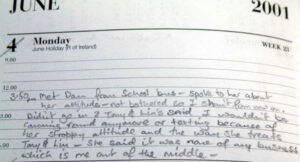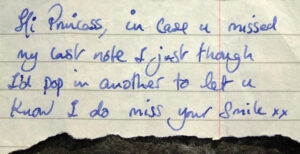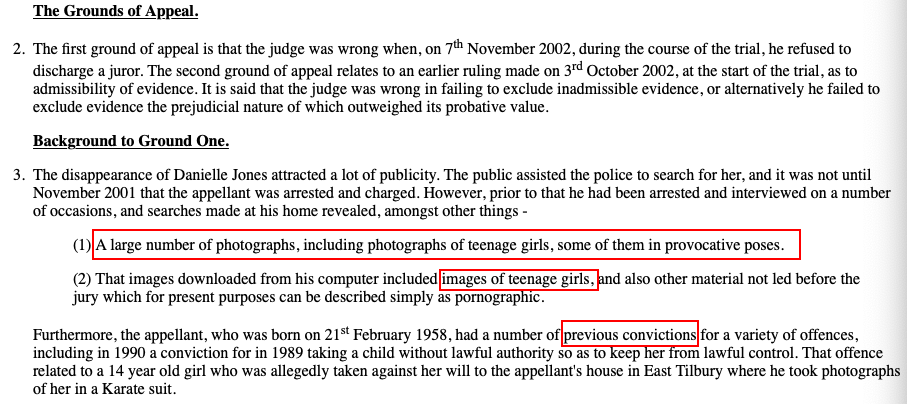Introduction to the case
Danielle Jones was a fifteen-year-old girl who disappeared on 18th of June in 2001 in East Tilbury, United Kingdom. She left her home that morning to go to school. She was last seen at the bus stop near her house waiting for the bus. She did not arrive her school, and no one knew where she could be. There were some witnesses who remembered seeing her talking with a man inside a blue van, but no one knew if she got in the car or not.
The police discovered that she had a close relationship with her uncle, Stuart Campbell. The police discovered that Campbell had a past related to the obsession with young girls. He had created a fake photography company called “Cinderella’s” to make photographs of young girls.

Few months before Danielle was kidnapped, Campbell approached two girls at the gym and proposed them to o some photoshoots at his house, showing the girls the card from his fake company. While the investigation, computer experts realized that Campbell had downloaded child porn pictures from some Internet sites, and they found some pictures of topless young girls in his computer. in 1989, Campbell finally received a 12-month sentence for retaining a 14-year- old girl in his house and taking topless pictures of her.
Another key aspect for considering him the principal suspect is that he had a blue van similar to the one which the witnesses had seen the day that Danielle was kidnapped.

It was found out that Stuart Campbell had a personal diary where he had a detailed record of his illegal conducts, including a daily record of his relationship with his niece Danielle. It was also found out that he left chilling notes to Danielle in her room while she and her family were out for holidays. In one note it said, “Hi princess, hope you have a lovely holiday. Text me when you get back – Love Stuart”. In the second note found in her room, it said, “Hi princess, in case you missed my last note I thought I’d pop in another to let you know I do miss your smile”.


When the police went to talk to him, he assured to be far from the crime scene the day that Danielle disappeared, and that he had received some messages from his niece the same day, when Danielle was supposedly disappeared. The police investigated and they discovered that the signal of his phone and the signal of Danielle’s phone were located at the same place at the time the messages were sent. Both phones were exactly at the same place, so Campbell was supposed to be with her when she was already disappeared.
The linguistic point of the case
When the linguist of the case, Malcolm Coulthard (a linguist from the University of Birmingham), analyzed the messages, he discovered some inconsistencies in the way of writing; there were some things that did not concur with other messages that Danielle had sent days before her kidnap. The linguist started analyzing both messages and other messages written by Danielle in other moments, and he came to the conclusion that the messages that were supposedly sent by Danielle the day of her kidnapping and the other messages were written by two different persons.
The messages in question were the following:
- HI-YA STU WOT YOU UP I’M SO MUCH TROUBLE AT HOME AT MOMENT. EVEONE HATES ME EVEN YOU WOT THE HELL HAVE I DONE Y WON’T YOU JUST TELL ME. TEXT BCK PLEASE. DAN XXX
- HI STU THANKZ 4 BEIN SO NICE UR THE BEST UNCLE EVER! TELL MUM I’M SO SORRY LUVYA LOADZ DAN XXX
After Coulthard studied a huge amount of previous messages written by Danielle, he arrived to some undoubtful features from Danielle and, therefore, some doubtful features from Stuart:
- She wrote in lowercase, never in uppercase. These messages were both written in uppercase
- She used to write the word “why” completely, with no abbreviations or substitutions. In one of these messages, the writer uses the letter “y” as an abbreviation of the word “why”, but Danielle did not use any kind of abbreviation for this word
- She wrote “every1” as a colloquial form. In one of these messages, it is used the word “eveone” instead of “everyone”, but Danielle used a numerical abbreviation
- She used the abbreviation “at the mo”. The phrase “at moment” is used in these messages, but Danielle did never use this form
- She used the form “wat” to refer to the word “what”. In these messages, “what” is replaced by “wot”, but Danielle did never write this word like this in any of her previous messages
According to a linguistic point of view, this case can be located in a specific field of Forensic Linguistic called Authorship Attribution. The linguist of this case had to take into account a lot of linguistic aspects, but lexis (spelling errors and morphological aspects) and punctuation are the basis of this case. The features studied in this case are the following:
- Accent stylization –> the process of using phonetic spelling to convey a specific accent or to make the reader read the word as it is pronounced, as in this case. An example of this feature could be the use of “wat” and “wot”, of “thankz” and “loadz” to illustrate the final /z/ sound; and “luvya” to illustrate the pronunciation of the phrase “love you”.
- Whole word letter homophone substitution –> replacing entire words with a single letter. For example “y” instead of “why” or “ur” instead of “you are”
- Syllable number homophone substitution –> replacing syllables within words with a number in order to imitate their pronunciation. For example, “every1”, using the number 1 at the final syllable of the word to imitate the pronunciation of this final syllable
- Shortening –> common words shortened to a few initial letters. A clear example is the use of the phrase “at the mo”, where the writer shortens the word “moment” to the first two initial letters and the result is the short word “mo”
The final decisions
Finally, Campbell was convicted of kidnap and murder of his niece Danielle Jones, and he was sentenced to life imprisonment. He was convicted and sentenced on 19th December 2002.  This is a fragment of the whole sentence document in which we can see all the evidence summed up (the highlighted parts). To see the complete document, click here: https://www.iclr.co.uk/document/2016076750/%5B2004%5D%20EWCA%20Crim%201130/html
This is a fragment of the whole sentence document in which we can see all the evidence summed up (the highlighted parts). To see the complete document, click here: https://www.iclr.co.uk/document/2016076750/%5B2004%5D%20EWCA%20Crim%201130/html
In 2004, Campbell made an appeal against his sentence because he and his lawyer thought that the evidence of his obsession with her niece and his interest on teenage girls should have been excluded from his trial. The other reason of his appeal was that one of the jurors was closely “implicated” in the case: this juror was the neighbor of one of the police officers involved in the investigation. Campbell claimed that because of this, the juror should have been discharged. Campbell’s appeal was set aside in 2005 by the Court of Appeal.


These fragments are from the appeal that Stuart Campbell’s lawyer presented to the Court. In these fragments we can see the explanation of the lawyer about the grounds of appeal of his client. To see the complete document, click here: https://www.bailii.org/ew/cases/EWCA/Crim/2005/248.html
Bibliography:
Coulthard, Malcolm and Alison Johnson. 2010. The Routledge Handbook of Forensic Linguistics. New York: Routledge Taylor & Francis Group
Garayzábal, Elena, Sheila Queralt and Mercedes Reigosa. 2019. Fundamentos de la lingüística forense. Madrid: Editorial Síntesis
Grant, Tim and Nicci MacLeod. 2011. “Whose Tweet? Authorship analysis of micro-blogs and other short-form messages”. In Proceedings of The International Association of Forensic Linguists’ Tenth Biennial Conference. 2011: 210-24. Aston University, Birmingham, UK.
Myall, Steve. 15 May 2017. “The Irish Mirror” [Accessed April 20, 2022]
Queralt, Sheila. 2020. Atrapados por la lengua: 50 casos resueltos por la lingüística forense. Barcelona: Larousse
Stuart Campbell’s appeal. ICLR (Incorporated Council of Law Reporting for England and Wales). April 23, 2004. [Accessed March 12, 2022]
Stuart Campbell’s appeal dismission. ICLR (Incorporated Council of Law Reporting for England and Wales). December 09, 2005. [Accessed March 12, 2022]
Stuart Campbell’s appeal summary. BAILII (British and Irish Legal Information Institute). February 09, 2005. [Accessed April 25, 2022]

Leave a Reply